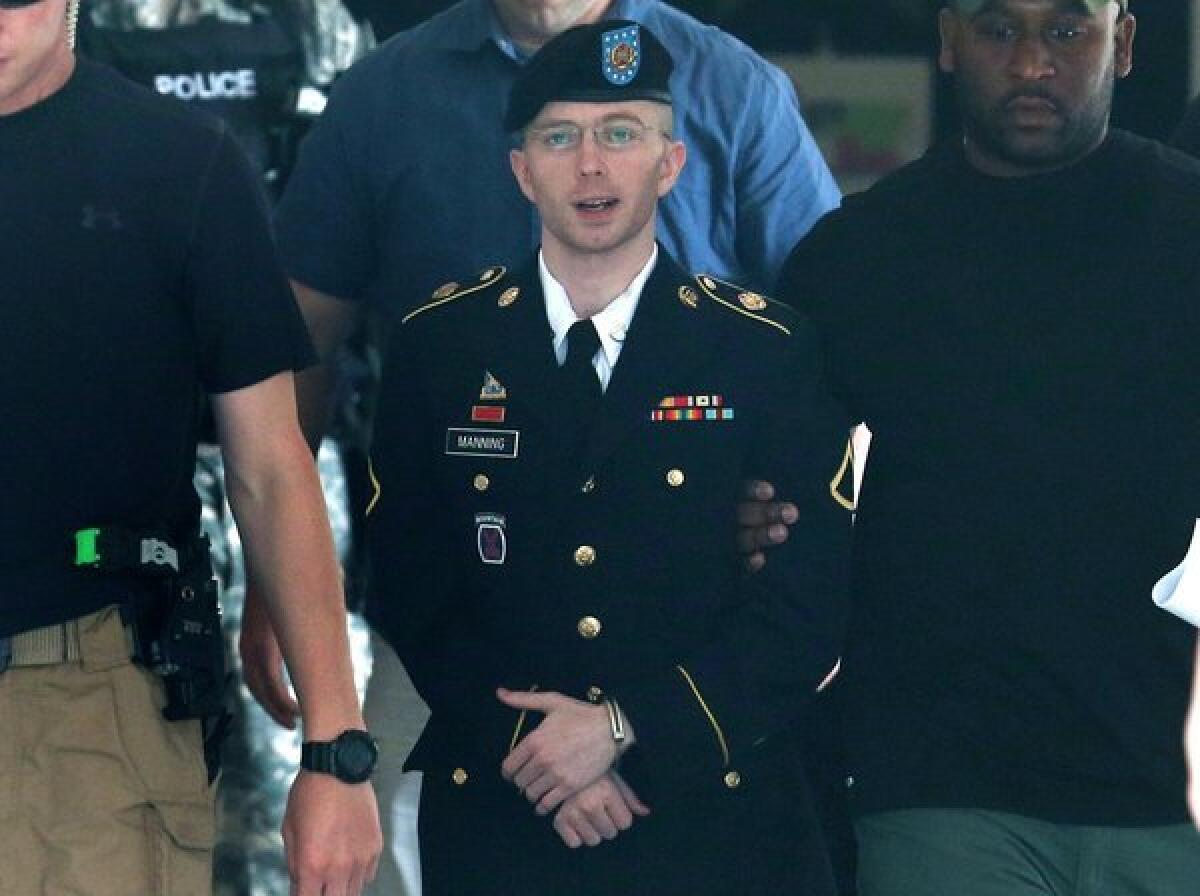Bradley Manning’s lawyers seek lesser sentence

FT. MEADE, Md. -- Defense lawyers for Army Pfc. Bradley Manning opened their case Monday in the sentencing phase of his court-martial by trying to show that the former military intelligence analyst was unstable and unfit, and that his commanders should never have deployed him to Iraq to handle sensitive material.
Manning, who was convicted last month of espionage and mishandling classified data for leaking 700,000 classified military and diplomatic cables and other secret material to WikiLeaks, faces up to 90 years in prison. His lawyers are hoping to persuade the military judge, Army Col. Denise Lind, to sentence him to a lesser term.
The lawyers portrayed Manning as confused, angry and overwhelmed. They suggested he was crying out to be removed from Iraq, where he was stationed, by flipping over a table in a confrontation with a superior and later reaching for a weapon during a counseling session.
Defense attorneys are expected to complete their case by midweek. Manning is likely to speak on Wednesday -- either by testifying on the witness stand, which would open him to cross-examination by prosecutors, or by reading a non-sworn statement in court.
Earlier this month, prosecutors defended seeking the maximum sentence for Manning, presenting evidence and testimony in closed sessions to describe the damage he caused to U.S. national security by releasing the vast trove of material to the anti-secrecy organization.
On July 30, Manning was acquitted by Lind of the most serious charge against him, aiding the enemy, but the judge convicted him on six counts of violating the Espionage Act and other offenses.
He initially faced up to 136 years in prison, but the judge later determined that many of the counts were duplicative and cut that to 90 years.
His legal team hopes for a much shorter sentence for their 25-year-old client.
Their first witness was Army Col. David Miller, who oversaw Manning’s deployment from Ft. Drum, N.Y., to Iraq in late 2009. Miller conceded that some officers in Manning’s chain of command were “less than average” and “mediocre,” and were removed from their commands.
He also said about 25 soldiers were ordered to undergo mental health evaluations because of the stress in a combat zone. Miller said 16 were approved for transfer out of Iraq. He also said there were two suicides among those deployed to Iraq.
After Manning’s arrest in 2010, Miller said, his unit conducted a comprehensive internal review to determine if any of “our procedures or processes” led to Manning being able to leak classified data. “It was a reason for us to take a look at ourselves and make sure we were doing things to the best of our ability,” he said.
But Miller said he did not know at the time that Manning was showing open signs of instability. He said he did not know that Manning had flipped over a table during a heated conversation with one of his superiors, and did not know Manning once “had to be restrained from reaching for a weapon” during a counseling session.
ALSO:
James ‘Whitey’ Bulger guilty in gangland killing-racketeering case
Sinkhole near Disney World causes a resort’s guest villa to collapse
Tennessee judge, citing Jesus, changes baby’s name from “Messiah”
More to Read
Start your day right
Sign up for Essential California for news, features and recommendations from the L.A. Times and beyond in your inbox six days a week.
You may occasionally receive promotional content from the Los Angeles Times.







